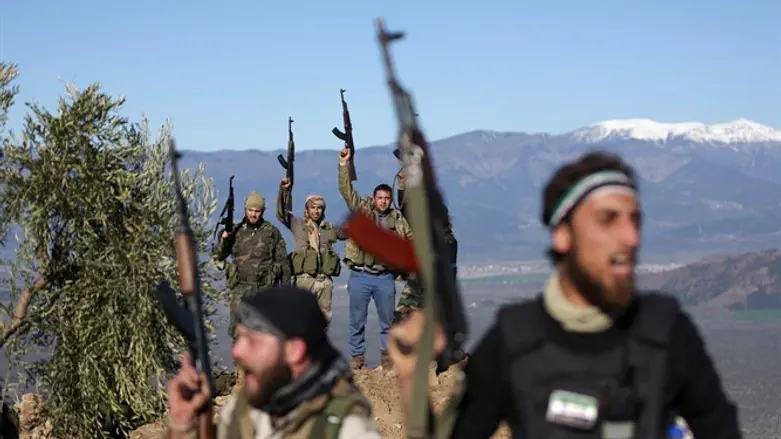
Yochanan Visser is an independent journalist/analyst who worked for many years as Middle East correspondent for Western Journalism.com in Arizona and was a frequent publicist for the main Dutch paper De Volkskrant. He authoreda book in the Dutch language about the cognitive war against Israel and now lives in Gush Etzion. He writes a twice weekly analysis of current issues for Arutz Sheva.
Last week the Turkish military and its ally, the Free Syrian Army, finally succeeded in capturing the city of Afrin in the most northern Kurdish autonomous canton in Syria.
The Kurdish militia YPG decided to evacuate its forces after the Turks and their allies had encircled the city from three sides, dealing a severe blow to Kurdish autonomy aspirations in Syria.
Turkish dictator Recep Tayyip Erdoğan used the victory to make new threats against the Kurds in both Syria and Iraq, while vowing not to leave Afrin “before the job is done”.
The Turkish government claims 3747 YPG fighters have died in the illn-named ‘Operation Olive Branch’ which lasted for more than two months. On the Turkish side 42 soldiers died while 159 fighters of the Free Syrian Army lost their lives, according to Russian state-controlled media.
Approximately 200,000 people were displaced as a result of the Turkish offensive which came to an abrupt end after the Kurds decided not to engage in urban warfare and left Afrin under the cover of civilian convoys.
There have been reports about looting by Erdogan’s forces after the fall of Afrin.
Turkish soldiers broke into shops and stole food but also other goods and even a number of motorcycles, according to Arab media.
On Sunday, the Turkish authorities reported that the Afrin canton was under “complete control” with the state-controlled Anadolu news agency reporting the Turkish army had started to sweep mines and explosives in anticipation of the return of the civilian population.
Experts on Turkey now say that the Afrin operation is another indication Erdogan is working to restore the Ottoman empire which included areas in Syria and Iraq such as Sinjar and Afrin.
The Turkish regime released a movie about the offensive in Afrin in which the victory over the Kurds was labeled a “conquest”, while state-controlled media used the same term to describe the fall of Afrin .
Fears that Erdogan will not stop his second intervention in Syria after the fall of Afrin seem therefore to be justified.
He will try to ‘liberate’ other parts of Syria and even Iraq where the outlawed Kurdistan Workers Party (PKK) has a foothold in the Sinjar region.
The hotheaded Turkish strongman has vowed he will now order his forces to move in the direction of the predominantly Sunni Arab city of Manbij which was liberated from ISIS by the Arab/Kurdish Syrian Democratic Forces (SDF) in 2016.
This will most likely pit the Turkish military against NATO ally the United States, which has vowed it has no intention to leave Manbij.
During a meeting in Istanbul of Erdogan’s AKP party the Turkish dictator said he “won’t take steps backward from here”.
He then said he had spoken with Russian president Vladimir Putin and his American counterpart Donald Trump about his plans to cleanse Manbij and the other two Kurdish cantons in Syria from ‘terrorists,’ a term he also uses to demonize his opponents in Turkey.
‘We won’t take steps backward from here. We are on the side of the suffering and the oppressed,’” Erdogan told his supporters while claiming that 160,000 Syrian “brothers and sisters” are now able to return home.
He meant a part of the Sunni Syrian Arab refugees who fled to Turkey as a result of the Syrian civil war.
A senior Trump official reacted by vowing the U.S. “has no intention to leave Manbij” which has a contingent of 2,000 American Special Forces which have been assisting the SDF in its battle against ISIS.
“US forces are located in Manbij. We have made it very clear with the Turkish government that we will continue to operate there,” State Department Spokeswoman Heather Nauert said during a press conference last week.
Incoming Secretary of State Mike Pompeo is expected not to execute a compromise which was reached by his predecessor Rex Tillerson, who last month brokered a deal with Erdogan about shared control of Manbij.
Pompeo is no fan of Erdogan and labeled Turkey “an Islamist dictatorship” after the botched coup in July 2016.
There’s more.
In southeastern Afrin, Erdogan’s forces could be on the edge of a confrontation with the Syrian army and its allies after they seized four villages and are now approaching a region which is under Syrian army control.
Unnamed sources told the Iranian Fars News Agency “Turkish forces have approached the regions near the two towns of Nobl and al-Zahra which are under the Syrian army's control now.”
After the new Turkish intervention in Syria, Assad’s forces made inroads to Idlib which neighbors Afrin and from there they proceeded in the direction of Afrin.
As for Iraq, Erdogan has repeatedly warned the Turkish army could come to Sinjar “overnight”.
"If (Baghdad) cannot (make an end to the PKK presence), we may turn up in Sinjar suddenly one night and clean up the PKK there," Erdogan said last Monday about the impending Turkish invasion of northern Iraq which he dubbed “Operation Tigris Shield”.
His remarks drew the ire of the central government in Baghdad which announced its absolute rejection of any foreign intervention in the territories under its control.
It didn’t stop Erdogan from ordering new airstrikes on PKK bases in northern Iraq after which the PKK announced it would withdraw 2,000 fighters from Sinjar.
Some media reports said the Turks had already invaded northern Iraq.
It was another indication that the Turkish dictator is waging a “personal war”, as one pundit put it, against the Kurds who dreamt to establish an independent state even before the allied forces divided the Middle East after WWI and created artificial states.